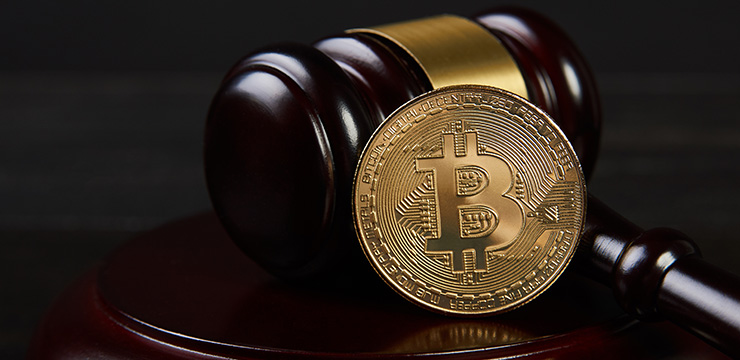Following the 2017 ICO boom and the more recent declines in cryptocurrency prices, blockchain-related litigation has substantially increased. U.S. courts have seen most of that action: American regulatory agencies have been more aggressive than their foreign counterparts (the SEC alone has over 200 open investigations), and private parties regularly bring individual suits and class actions. Altogether, close to 100 cases have been filed.

In two recent cases, the courts—for the first time—ruled on jurisdictional questions related to foreign companies by considering the technical aspects of blockchain technology. The opinions in In Re Tezos Securities Litigation and Alibaba Group v. Alibabacoin Foundation illustrate the following three points:
- The physical location of the verifying nodes can affect the court’s jurisdictional analysis.
- On personal jurisdiction, existing case law related to foreign online businesses serves as useful guidance for blockchain companies seeking to avoid U.S. litigation.
- Strategic dispute resolution and forum selection clauses can save the day.
Considering the importance of these issues for avoiding U.S. litigation and the space required to provide enough legal background to meaningfully discuss them, each issue will be addressed in a separate On the Chain post. Today we will address the first point: location of the nodes (the individual devices part of the larger data structure maintaining a copy of the blockchain and, in some cases, processing transactions).
****************************
The physical location of the verifying nodes can affect the court’s jurisdictional analysis
When a foreign defendant is sued in a U.S. court, the court must determine that the U.S. laws in question can be fairly applied and the court has personal jurisdiction over the foreign party. While well-developed legal principles continue to govern the analysis, when a party is a company that uses blockchain and distributed ledger technologies, its reliance on multiple nodes that are physically located across the world raises unique jurisdictional questions. The following two cases tackle this issue.
In re Tezos Securities Litigation, No. 17-CV-06779-RS (N.D. Cal. Aug. 7, 2018)
In In re Tezos, Judge Seeborg addressed whether U.S. securities laws apply extraterritorially to a foreign company that sold tokens to U.S. residents in an ICO. As the readers are probably aware, the Tezos ICO was one of the largest to date, raising over $230 million in July 2017. Tezos Foundation, a Swiss defendant, argued that the sale of the security was not a “domestic transaction” and therefore the Exchange Act did not apply. The Court then posed the question, “where does an unregistered security, purchased on the internet, and recorded ‘on the blockchain,’ actually take place?”
Although the Contribution Terms of the Tezos ICO stated that Alderney (an English Channel Island) was the “legal site” of the transactions and the place where the “contribution software” resided, the Court held that the transaction occurred in the U.S. for the following reasons: (1) the plaintiff participated in the ICO from the U.S. (paying in Ether), (2) payment was made through interactive website that was hosted on an Arizona server, (3) the website was primarily run by an American co-defendant located in California, and (4) plaintiff’s contribution of Ether to the ICO “became irrevocable only after it was validated by a network of global ‘nodes’ clustered more densely in the United States than in any other country.”
Alibaba Group Holdings Limited v. Alibabacoin Foundation, No. 18-CV-2897 (S.D.N.Y. Oct. 22, 2018)
But not all judges give this much weight to the location of the nodes. In Alibaba v. Alibabacoin, Judge Oetken also addressed questions of jurisdiction and the location of blockchain nodes. In Alibabacoin, a trademark case, the Dubai- and Belarus-based defendant (Alibabacoin) argued that the Court lacked personal jurisdiction over it because its ICO sales did not occur in the U.S., since the transactions “consist of ledger entries made in Minsk, Belarus, following observation of changes in ‘blockchain data’ outside the United States.”
In asserting U.S. jurisdiction, Judge Oetken did not buy this argument. The Court held that the place where the transaction is put on the ledger is not relevant, comparing this situation to an everyday online purchase: “it would constrain common usage to say that the transaction occurs at the potentially remote location of the servers that process the buyer’s banking activities and not at location where the buyer clicks the button that commits her to the terms of sale.” The Court concluded that the plaintiff had demonstrated with reasonable probability that personal jurisdiction over Alibabacoin existed, based on other factors, which will be addressed in the next post.
In the future, the courts are likely to continue to focus on blockchain data structure
In Re Tezos appears to be the first time the courts have considered the location of the nodes to be relevant for jurisdictional analysis. But the cases also show that the courts are only beginning to wrestle with this issue. Jurisdictional analysis will always depend on individual facts and the claims asserted. For example, when focusing only on the fourth factor of Judge Seeborg’s analysis (the location of the nodes), all projects using ERC-20 tokens, which depend on the same cluster of Ethereum nodes, could be considered to operate to some extent in the U.S. Furthermore, the importance of the nodes in jurisdictional analyses is likely to rise because the cases currently in courts are mostly ICO-related. That is, most of the ongoing litigation does not stem from the operation of the blockchain technology but is related to fraud, trademark disputes, and failures to register with various regulatory agencies.
Soon when more blockchain projects become operational and disputes arise in relation to such issues as on-chain transactions, hacking, security failures, and disputes over the governing of the networks, the importance of the data structure of these networks will increase. As a result, the influence of nodes as a factor in the courts’ analyses is also expected to increase, and many foreign blockchain companies that are avoiding the U.S. may, nevertheless, be dragged to U.S. courts.
As will be discussed in the upcoming posts, there are steps a company can take to avoid litigating in U.S. courts, including the set-up of its operations, drafting of its contracts with customers and partners, and litigation strategies pursued in court.









